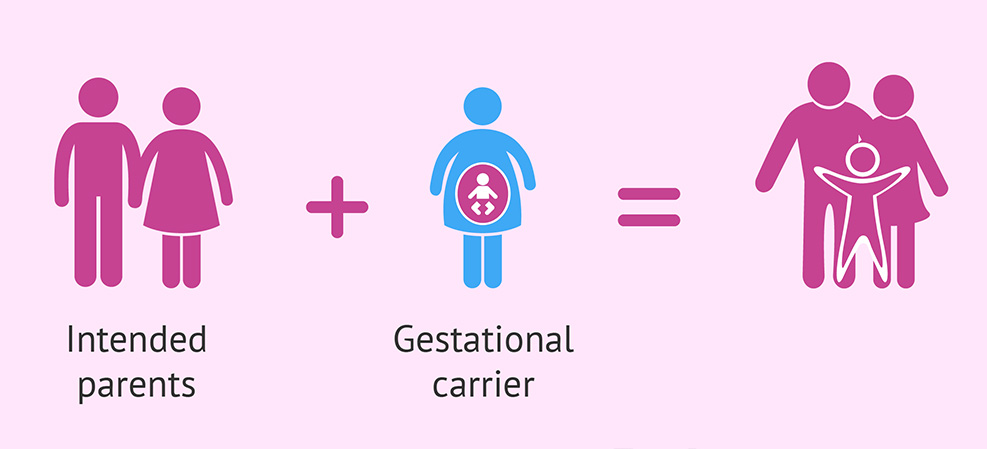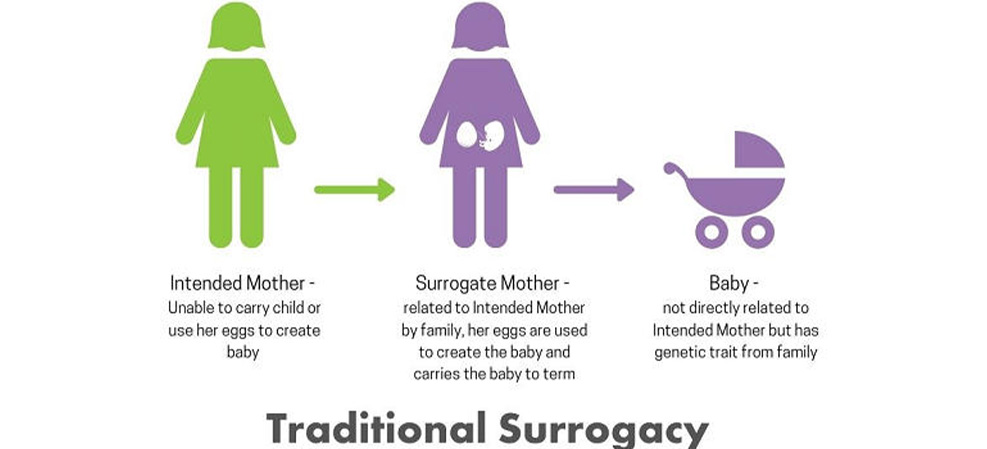
Choosing surrogacy as a reproduction method by intended parents to welcome their new child is a significant decision. Making the best decision requires proper knowledge of surrogacy types and the risks for both intended parents and surrogate mothers could encounter them in the complicated surrogacy journey. Surrogacy has two main types: Traditional and gestational surrogacy. In this article of TebMedTourism, we will answer the significant question “traditional vs. gestational surrogacy, which one is better?” Stay with us and read the article to get information on the definition of the types of surrogacy, discuss the differences between both types, observing all influential factors and elements that can impress in both types of surrogacy and the most popular type of surrogacy. These factors divided in two sections: 1. medical and 2. Legal. TebMedTourism, as an international facilitator company in medical fields, by considering medical and legal aspects, can turn the surrogacy journey into the best experience in the life of intended parents and dependent on them, the surrogate mother.
Surrogacy in Iran | |
|---|---|
Legacy | Legal |
Cost | 21,000$ (needs more consultation) |
Anesthesia | No |
Hospital Stay | Zero day |
Minimum Stay in Iran | 3 to 4 weeks |
There are two major types of surrogacy: traditional and gestational. It is safe to say that nowadays the gestational surrogacy is more popular option. But it is essential to know both options differences and advantages and disadvantages of surrogacy to decide which one is the best choice for you.
 In gestational surrogacy, the surrogate (a woman who carries the baby) is not biologically linked to the child that she is carrying. In other words, she doesn’t share her DNA with the baby, and also, the baby doesn’t look like her. IVF, or in vitro fertilization, is a reproduction method that is used to generate the embryo in a lab (IVF). The intended father's (or donor's) sperms and the intended mother's (or donor’s) eggs are used to generating the embryo. After that, it will be transferred to the surrogate's uterus. In exceptional cases in surrogacy for HIV-positive couples, two steps for preparing sperm are essential. ART (antiretroviral therapy) and sperm washing procedures should apply to sperm before using IVF in these cases.
In gestational surrogacy, the surrogate (a woman who carries the baby) is not biologically linked to the child that she is carrying. In other words, she doesn’t share her DNA with the baby, and also, the baby doesn’t look like her. IVF, or in vitro fertilization, is a reproduction method that is used to generate the embryo in a lab (IVF). The intended father's (or donor's) sperms and the intended mother's (or donor’s) eggs are used to generating the embryo. After that, it will be transferred to the surrogate's uterus. In exceptional cases in surrogacy for HIV-positive couples, two steps for preparing sperm are essential. ART (antiretroviral therapy) and sperm washing procedures should apply to sperm before using IVF in these cases. Traditional surrogacy, also called genetic surrogacy as the surrogate is the genetic mother and shares her DNA. Traditional surrogacy is one of the oldest reproduction methods that surrogates utilize their own ova in producing an embryo. In traditional surrogacy procedures, because using sperm from the intended father or a sperm donor, the embryos are created go in through IUI. After IUI, the surrogate mother should have special consideration to increase the IUI success rate. A High IUI success rate enhances exceedingly the success rate of surrogacy. Similar to the other reproduction fertility process to increase the success rate, the age of the surrogate and egg donor is very important. On the other hand, traditional surrogacy can be legally and emotionally complicated because the biological mother is the same surrogate mother, so in choosing the surrogacy agency, you should be careful so that everything is managed well.
Traditional surrogacy, also called genetic surrogacy as the surrogate is the genetic mother and shares her DNA. Traditional surrogacy is one of the oldest reproduction methods that surrogates utilize their own ova in producing an embryo. In traditional surrogacy procedures, because using sperm from the intended father or a sperm donor, the embryos are created go in through IUI. After IUI, the surrogate mother should have special consideration to increase the IUI success rate. A High IUI success rate enhances exceedingly the success rate of surrogacy. Similar to the other reproduction fertility process to increase the success rate, the age of the surrogate and egg donor is very important. On the other hand, traditional surrogacy can be legally and emotionally complicated because the biological mother is the same surrogate mother, so in choosing the surrogacy agency, you should be careful so that everything is managed well. 
In traditional (partial) surrogacy, the surrogate is fertilized by the sperm of the intended father by using IVF or ICSI method or intrauterine insemination (IUI). The important issue is that she uses her own eggs so she is the biological mother of the baby. In this process, she must refuse her parental rights and give the full custody of the baby to the intended parents. In most cases, the surrogate remains unknown forever but in other cases they may decide to let the surrogate have a part in the child’s life in limited regards.
The positive point of this type of surrogacy is that it is cheaper because it may not need IVF process and an injection of father’s sperm would be adequate. Moreover, finding an egg donor and doing the egg retrieval process are not required.
Among the negative points of traditional surrogacy, the legal parental rights of the surrogate are remarkable issues. It is an emotional process and the surrogate can change her mind and decide to keep the baby. The intended parents need to complete a post-birth adoption contract to gain the custody of the baby. Due to these potential conflicts, American surrogacy and many of the agencies do not conduct the traditional surrogacy.
In gestational surrogacy (full or host surrogacy), the surrogate dos not share her genetics with the baby. The eggs and sperms of the intended parents (or donors) are combined to make the embryo(s) then by the use of infertility treatment techniques (IVF or ICSI) it is implanted into the surrogate’s uterus. Thus she is merely the carrier of the baby. The embryo is transferred through the catheter which is simple and painless and doesn’t require anesthesia.
One of the positive points of this type is that both intended parents can be genetically related to the baby. Your mind is in peace because you know that you have the full parental rights of the baby. Also this type of surrogacy has a high success rate.
For the negative points of this type of surrogacy, the higher cost of fertility treatments can be mentioned. You need to spend extra money and time to harvest the eggs of the intended mother or a donor. Sometimes multiple IVF attempts are needed before pregnancy happens. The surrogate expenses have to be carefully considered by the intended parents. And finally you have to control your feelings about your future baby and trust the surrogate to deliver your baby safe and sound.

The main difference between the traditional and the gestational surrogacy is the biological links between the surrogate and the baby which can have many impacts on the other factors. We are going to talk about major factors briefly.
In traditional surrogacy, egg donor is not needed because the surrogate uses her own eggs but in gestational surrogacy an egg donor may be needed for single men, same-sex couples and women who do not have healthy eggs.
in traditional surrogacy, IVF is not necessarily needed and the surrogate mostly undergoes artificial insemination using intrauterine insemination (IUI) which is an easier process. In gestational surrogacy IVF or ICSI is required to create the embryo and transfer it into the surrogate’s uterus.
traditional surrogacy is cheaper than gestational surrogacy because of the medical procedure differences. IVF is more expensive than IUI. Moreover, egg donation and fertility treatment of the intended mother are not required.
waiting time for gestational pregnancy is shorter than traditional one because it is legally and emotionally easier for surrogates not to carry their own child. Hence, finding surrogates in gestational way takes less time.
traditional surrogacy often involves additional legal attempts because the surrogate is the biological mother of the baby and she has the parental rights which have to be terminated after the delivery. But in gestational surrogacy, the parentage of the child is established by the pre-order contract and the intended parents are the biological parents of the child so it faces less legal difficulties.
although the cases in which the surrogate changes her mind and decides to keep the baby are rare but legal and emotional risks in traditional surrogacy are higher. It is because of the blood connection between the surrogate and the embryo which may cause the surrogate bond with the baby. In these cases, the intended parents and the agency would be involved and they have to fight for the custody in court.

It is difficult to say which type of surrogacy is better because both of them have their pros and cons. So it should be considered precisely by both intended parents and surrogate and be decided based on their conditions and needs.
Cost of surrogacy is one of the most important elements for the couples that should be figured out. One of the important considerations is whether the intended mother wants to use her own eggs or needs an egg donor. If she wants to use her own eggs, then gestational surrogacy is the best choice. In order to achieve this goal, their budget is an important factor before starting. Candidates must afford multiple attempts of IVF and egg donation if they want to proceed with gestational way.
As we talked about the traditional surrogacy, surrogate and baby will have a biological relationship. So they should consider some related issues in advance, including whether the intended parents are comfortable with this biological links and also what kind of relationship they want to maintain with the surrogate.
In some Muslim countries, surrogacy is still a controversial subject. Therefore, due to the importance of this subject, we talked about surrogacy in Islam in our previous articles. If you are a Muslim and you are considering doing this process, you can check it out and get informed about Islamic rules on this topic.
Nowadays, Iran is one the best surrogacy bases for its affordable prices, expert physicians and high-quality services. You can get all the information you need at surrogacy in Iran.
At TebMedTourism, we are here to help you with your surrogacy journey. With our caring team, you can be sure about making the right choice and receiving a customized plan by the help of our experienced professionals. Contact TebMedTourism to speak with a surrogacy specialist and learn more about how we can help you grow your family. Our consultations are free of charge during the week 24/7.
If you need more information on this topic and want to consult, contact us NOW.
The consultant medical doctors of TebMedTourism Co. are at your service for free.

Communication ways:
call us: +98 912 098 5010
Visit us:
No.2, First 8 meter alley, Nobovvat sq., Tehran, Iran
Mail us: [email protected]

Comments & Questions